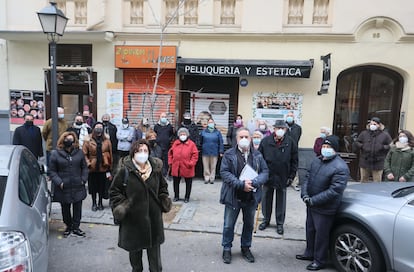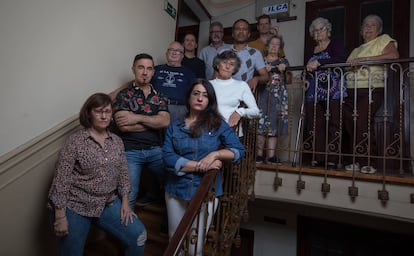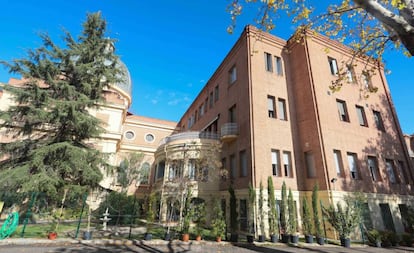Families, seniors and nuns among victims of Spanish Church property scandal
Building sales linked to religious foundations in Madrid are currently under investigation by anti-corruption prosecutors, and have also sparked action by a Vatican lawyer

On June 30, 2016, a short man in his fifties walked purposefully into a building on Núñez de Balboa street, in Madrid’s upscale Salamanca neighborhood. David López Royo, who had once worked as a regional newspaper editor in Andalusia, had just been appointed president of 74 Catholic Church foundations by the archbishop of Madrid, Cardinal Carlos Osoro. He now had more than a thousand employees working for him. “He is like a snake charmer,” summed up one of his former workers.
That afternoon, Royo walked into the Molina Padilla Foundation to lay out the new rules. His arrival caught Gema Molina by surprise. She had been managing the foundation since the 1980s, when she was placed in charge of protecting the legacy of her grand-uncle Alfonso. Alfonso had died childless in 1957, and his will had stipulated that he wanted to create a foundation to provide study grants to needy children in the province of Málaga.
The foundation earns revenue from rent paid by around 70 families living in two five-story apartment buildings located in this wealthy part of town. Seventy percent of these earnings go toward the scholarships. Following the founder’s wishes, the organization has always been run by a family member, with the archbishop of Madrid serving as its president.
These individuals are only interested in business. In the end, they will manage to make the foundation disappear with all their sales and purchases and commissionsGema Padilla, the grand-niece of the founder of the Molina Padilla Foundation
But when Royo walked in on that June afternoon in 2016, he knew that changes were going to be made. According to sources close to Osoro, it was Royo who recommended merging most of Madrid’s Church-controlled foundations. Why have 74 when that number could be reduced to just four or five, he argued. Royo claimed that most of these organizations were very poorly managed.
Between 2016 and 2018, Royo spent his time meeting with the boards of trustees of the 74 foundations. Most of the people consulted by this newspaper said that he seemed in a big hurry to carry out the merger. Three foundations were ultimately divested of their real estate holdings in sales at below-market prices that are currently under scrutiny by anti-corruption prosecutors and judges. And a Vatican envoy has instructed a Madrid law firm to reverse all the sales.
The operations affect nearly 200 families who pay rent on their apartments, as well as more than 100 elderly people and around 20 nuns who help them at a senior care home located near the Santiago Bernabéu soccer stadium.
The proceeds of the sales were meant to go toward the purchase of a large plot of land southwest of Madrid to build a “City of Mercy,” a mini-Vatican of sorts that would contain senior care homes, student residence halls and Catholic schools. But the plan never came to pass.
In the meantime, the Church has bought land in Valdebebas, in northern Madrid, for €48 million, significantly above its market value. The idea is to build and rent office space there.
Two more suspect sales
Besides the Molina Padilla Foundation case, EL PAÍS last year uncovered two more questionable sales of Church assets. One case involves 14 buildings owned by the Fusara Foundation in downtown Madrid, which were sold for €74 million to an opaque group of 14 companies. Another case involves the €37-million sale of a senior care home and church building by the Santísima Virgen y San Celedonio Foundation to Nebrija University, a private education center.
Both sales were conducted at below-market prices, according to real estate experts consulted by this newspaper. And both involved the same three men who organized the Molina-Padilla sale, and who reportedly took millions of euros in fees from the transactions.
Anti-corruption prosecutors and three Madrid courthouses are now investigating these financial operations, which include monthly payments to the archbishopric and to individuals who are simultaneously on the payroll of all three foundations.
When the Vatican heard about the news, it sent a lawyer to advise Archbishop Osoro. The envoy from Rome has instructed a Madrid law firm to turn all the sales around. “It’s all very complicated,” said this lawyer in a telephone conversation.
These sales have one thing in common: a law firm named Chávarri Abogados, which acted as a go-between and earned fees of close to 6%, according to sources familiar with the transactions.
In 2018 this firm created a foundation, Chávarri por el Bien Común (Chávarri for the Common Good), whose executive director became David López Royo – the same man in charge of the 74 Church foundations. Royo, who told this newspaper that he works for the Church for free, began to receive a paycheck from the law firm. In other words, he was working simultaneously for them and for the Church. Last year Royo stated that he saw no conflict of interest despite being on both sides of the sales, but he stepped down as head of the Church foundations in November 2019.
Sacking the Molina Padilla Foundation
On April 25, 2018, Royo returned to the Molina Padilla foundation, where he had called a meeting of the trustees. The minutes of the meeting show that he announced that its manager, Gema Molina, could not simultaneously be a trustee and receive a salary from the foundation. “If you don’t resign, the Molina Padilla Foundation will be immediately taken over by the Foundation Protectorate,” he threatened, alluding to a state-run watchdog agency. Gema Molina got scared and resigned on the spot. Some time later, the Protectorate said that the foundation was being run in an exemplary fashion. But it was too late.
Royo’s threats concealed a master plan to replace trustees with trusted aides to ensure favorable votes. One of these individuals was Antonio Chávarri, a founding partner of Chávarri Abogados and president of the foundation that was paying a salary to Royo.
In February 2019, Chávarri proposed creating a committee to make decisions about the Molina Padilla Foundation’s assets. In practice, this meant selling the foundation’s two buildings, which house 70 families and provide the funds for the children’s study grants in Málaga. The new trustees were in a hurry to sell off assets with “low profitability” despite the fact that the foundation’s accounts were always in the black.
A new trustee was brought on board, a lawyer and former city planning advisor for the Madrid regional government, Manuel Fernández Clemente. The latter was appointed secretary and he immediately awarded himself a monthly salary of €3,000, guaranteed over the next 10 years. Termination before that date would result in annual compensation of €27,000 for every missing year. Other aides were hired and given salaries of more than €1,500 a month.
In October 2019, Chávarri Abogados produced an appraisal of both buildings and an offer from two prospective buyers. Carlos Herrero, the husband of Gema Molina and a board member himself, voted against as he had on every other vote. “I was sick of watching this sacking happening in real time,” he says. The meeting was tense, but Herrero’s opposition was of no use: there was a majority in favor of the sale.
The buildings were valued at a little under €17 million. A company named Building The Next Success SL was offering €13 million, but the board agreed to sell. EL PAÍS has found that Building The Next Success has ties to another company where Raúl Chávarri Aricha, brother of Antonio Chávarri, sits on the board. At the time of the sale, this company had assets worth €3,000.
Gema Molina’s husband, Carlos Herrero, decided to take it up with the archbishop of Madrid a year ago. According to witness accounts, Osoro was astounded and told his own inner circle that the sale had to be stopped at all costs. But the promise was never fulfilled.
For now, the Molina Padilla Foundation’s buildings will not be sold. In May, the archbishop of Madrid ordered the sale reversed and announced his departure from the board. But for the first time, the children of Málaga have been left without their study grants. “The worst part is that people who should have been doing good deeds have instead tried to get rich through lies and deceit,” says Carlos Herrero.
“My biggest concern was to fulfill my uncle’s wishes,” says Gema Padilla, the grand-niece of the foundation’s founder. “But these individuals are only interested in business. In the end, they will manage to make the foundation disappear with all their sales and purchases and commissions.”
Fusara Foundation
The second organization in distress, the Fusara Foundation, has a mission to provide a Catholic education to low-income children. In 2008 it had assets worth €70 million and last year it owned 14 buildings in downtown Madrid, where around 170 families live in apartment rentals. These buildings were sold last year for €74 million to an opaque conglomerate of 14 companies.
Sebastián Navarro, 61, lives in a foundation building in the neighborhood of Lavapiés. He contacted the other residents and together they took the case to the courts: “It was very clear that they wanted to kick us out as soon as possible.”

In this operation, each of the Fusara Foundation’s 14 residential buildings was bought by a separate company, although all 14 of them are under one umbrella group. They were all created between April 2 and June 13, 2019, with assets of €3,010 each, and all of them had the same administrator: a woman named María Elena García Pastrana, who has 1,012 companies registered to her name in Spain, according to business registry records.
The foundation’s assets were sold below market-price for €74 million. The archbishopric of Madrid received half of that amount on July 30, 2019, in a transfer of funds from a Luxembourg bank to an account at BBVA, this newspaper has confirmed.
A member of the foundation’s board said that the buildings were sold because they were in poor shape and there was no money for restoration. But most of the housing is in perfect condition, and more than 40 tenants said that they personally invested thousands of euros in maintenance. Now, their future is also in the hands of a Madrid court, which is investigating the sale. Four people with ties to the archbishopric are under scrutiny for alleged crimes of fraud, corruption and mismanagement.
Senior care home
At the senior care home run by the Santísima Virgen y San Celedonio Foundation, Sister Rosario was feeling downcast a year ago. She had just found out about the plans to sell the building. “We found out in March [2019]. That’s all we know,” she said. The residence and the adjoining church of San Jorge were sold to Nebrija University for €37 million.

The foundation was created in 1916 thanks to a donation by a marquis who wanted to provide care for underprivileged elderly people. The building is a culturally protected landmark site. According to the board, the sale was backed by 90% of the families of the 100 or so residents. But families say they only got a letter. Pedro Sánchez, 71, pays €1,832 a month for his mother’s room and upkeep at the care home. He says he was told that the residents would be transferred to the new City of Mercy in October 2021.
“All the numbers they gave us are false. How could you sell this for €37 million?” he asks, in reference to the below-market price. “Nobody can believe that. But what could we do? Our hands were tied.”
The trustees hold that the residence did not meet modern standards and that its residents deserved better care. But documents seen by this newspaper show that reconditioning work worth €1.5 million was undertaken two years ago. Another trustee said that the foundation had no money for unforeseen expenses. But the accounts show an average profit of €177,460 over the last five years.
English version by Susana Urra.
Tu suscripción se está usando en otro dispositivo
¿Quieres añadir otro usuario a tu suscripción?
Si continúas leyendo en este dispositivo, no se podrá leer en el otro.
FlechaTu suscripción se está usando en otro dispositivo y solo puedes acceder a EL PAÍS desde un dispositivo a la vez.
Si quieres compartir tu cuenta, cambia tu suscripción a la modalidad Premium, así podrás añadir otro usuario. Cada uno accederá con su propia cuenta de email, lo que os permitirá personalizar vuestra experiencia en EL PAÍS.
¿Tienes una suscripción de empresa? Accede aquí para contratar más cuentas.
En el caso de no saber quién está usando tu cuenta, te recomendamos cambiar tu contraseña aquí.
Si decides continuar compartiendo tu cuenta, este mensaje se mostrará en tu dispositivo y en el de la otra persona que está usando tu cuenta de forma indefinida, afectando a tu experiencia de lectura. Puedes consultar aquí los términos y condiciones de la suscripción digital.









































